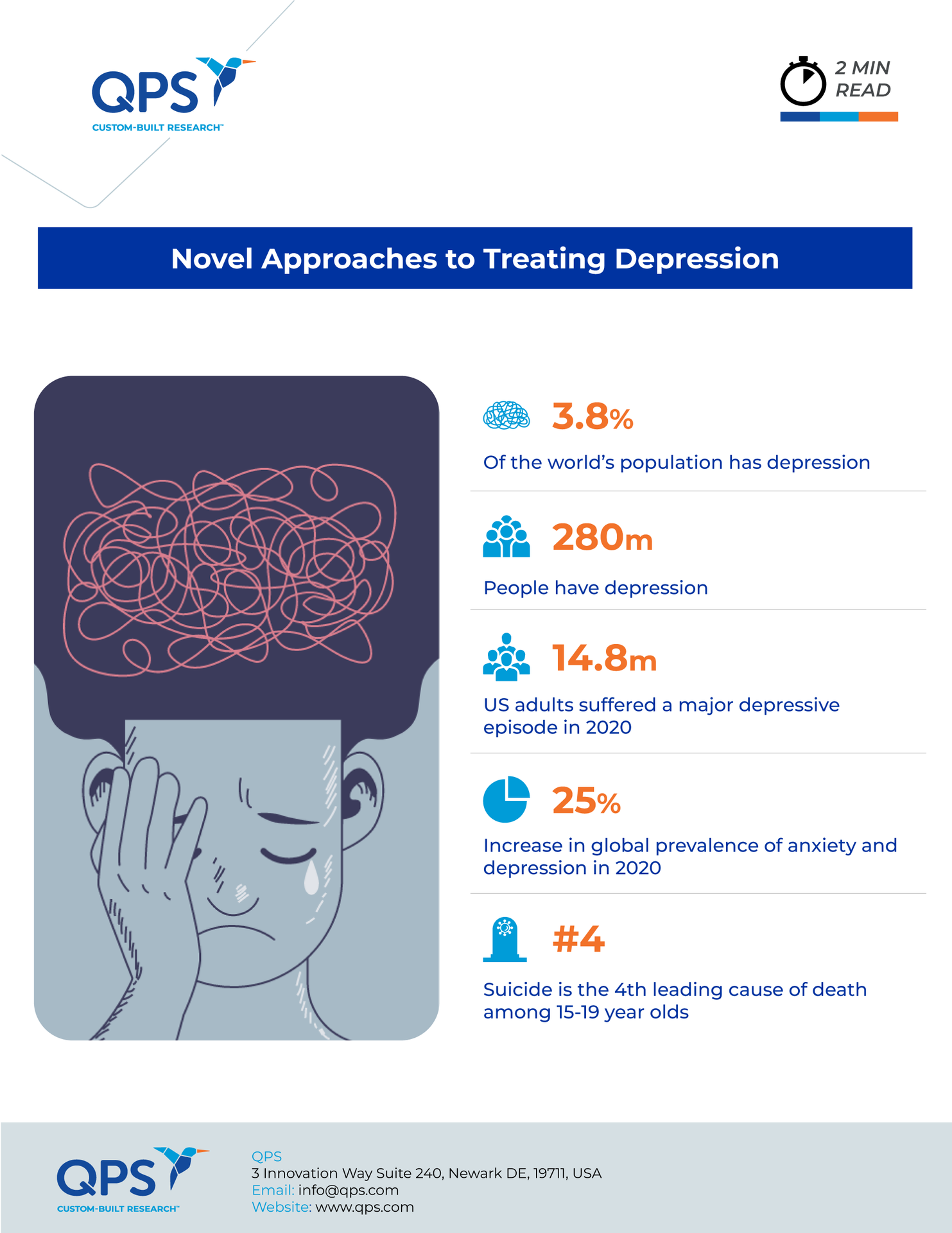Suicide is the second leading cause of death among Americans between the ages of 10 and 34, per the Centers for Disease Control and Prevention (CDC). That alarming statistic is enough to classify suicide as a major public health concern, even with the ubiquity of anti-depression drugs in today’s pharmaceutical market. Fortunately, clinical researchers are working to explore novel approaches to treating depression. Stat News reports that the National Institute of Mental Health (NIMH) awarded eight grants last year to “test new ways to reduce suicidal thoughts and behaviors in a fast-acting manner.” Read on to find out more about how these novel approaches could transform the medical community’s approach to depression, giving patients a new lease on life.
Treating Depression: The Status Quo
In a 2021 article, Stat News reporter Claudia López Lloreda wrote that most patients with depression are treated with selective serotonin reuptake inhibitors, or SSRIs. This class of drug, which includes well-known options like Zoloft and Prozac, works by controlling the amount of serotonin in the brain. Serotonin is a neurotransmitter that controls mood and emotions; by boosting serotonin levels, SSRIs may help patients with depression experience better mood and emotional regulation. Unfortunately, SSRIs often take weeks to take effect, leaving patients with potentially worsening depression. In addition, about one out of every three patients with depression is considered “treatment-resistant,” meaning traditional antidepressants fail to ease their symptoms. Despite this, doctors have largely clung to the status quo in terms of treatment for depression – but now, a number of studies have explored promising alternatives.
Ketamine: A Promising Novel Approach
Once used as an anesthetic on battlefields, ketamine is now gaining ground as a promising treatment for some cases of treatment-resistant depression. Just as SSRIs impact serotonin, ketamine works through receptors for another neurotransmitter: glutamate. Like serotonin, glutamate dysfunction is symptomatic of depression. One Yale University study found that ketamine rapidly improved depression symptoms in seven patients; now, years later, researchers are building on those promising results. For example, in 2019, the FDA approved a treatment called Spravato. According to Stat News, Spravato is a nasal spray that delivers a version of ketamine called esketamine that is shown to be effective in adults with treatment-resistant depression.
What Other Approaches Are Researchers Exploring?
Ketamine isn’t the only novel depression treatment making waves with medical professionals. Researchers are also exploring the possibilities of psilocybin, the compound present in hallucinogenic mushrooms. One study published in the New England Journal of Medicine showed that psilocybin was as effective as one common antidepressant drug. Meanwhile, a company called Cybin is actively engaged in clinical trials exploring psilocybin as a treatment for major depression. Outside of the psychedelics realm, researchers are also studying the effects of experimental treatments like deep brain stimulation and even anti-inflammatory immune support. While many of these treatments are still in the early stages of clinical trials, they could prove promising for doctors hoping to advance depression treatment beyond the SSRI-based status quo.
_____
Between ketamine, psilocybin, and unique approaches like deep brain stimulation, the world of psychiatry has come a long way in the last two decades. While many novel approaches to treating depression are still in early stages, patients may soon have a world of options outside of traditional SSRIs.
QPS is a GLP- and GCP-compliant contract research organization (CRO) delivering the highest grade of discovery, preclinical and clinical drug research development services. Since 1995, it has grown from a tiny bioanalysis shop to a full-service CRO with 1,100+ employees in the U.S., Europe and Asia. Today, QPS offers expanded pharmaceutical contract R&D services with special expertise in neuropharmacology, DMPK, toxicology, bioanalysis, translational medicine and clinical development. An award-winning leader focused on bioanalytics and clinical trials, QPS is known for proven quality standards, technical expertise, a flexible approach to research, client satisfaction and turnkey laboratories and facilities. Through continual enhancements in capacities and resources, QPS stands tall in its commitment to delivering superior quality, skilled performance and trusted service to its valued customers. For more information, visit www.qps.com or email [email protected].






